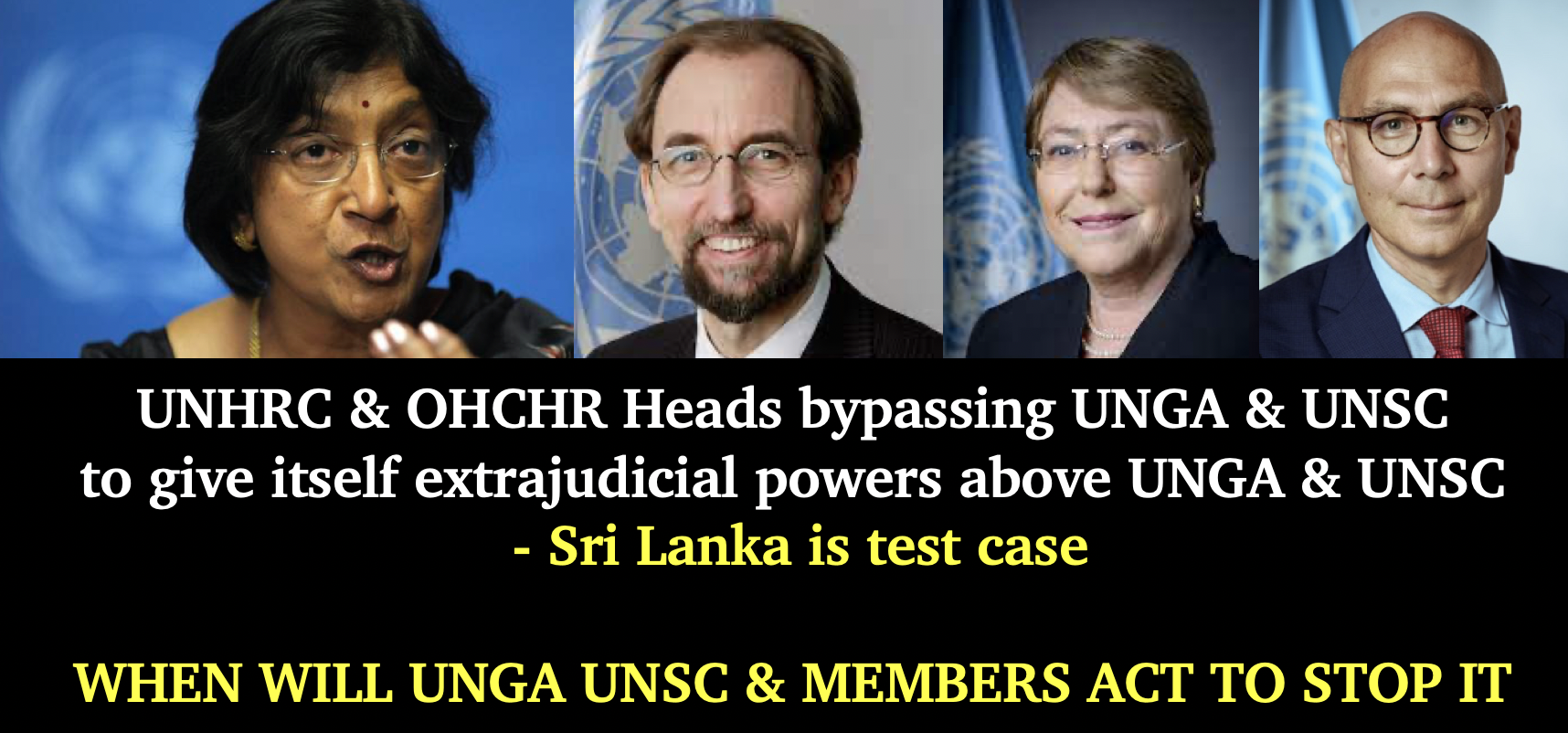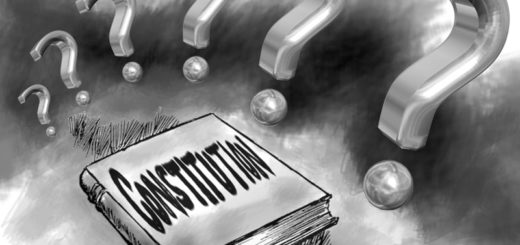Sri Lanka vs. UNHRC: How High Commissioners abused mandates, exceeded authority, and politicized Human Rights

We are concerned about the consistent manner that successive UN High Commissioners for Human Rights have been involved or caved into pressure by a handful of bloc nations using the UNHRC to exert political pressure over nations. Not only have resolutions been intrusive, and beyond the Human Rights Councils advisory mandate as per UNGA Resolution 60/251 (2006) the Council is now venturing into acting as quasi-prosecutors, prejudging Sri Lanka’s armed forces as war criminals based on well-funded smear campaigns. The latest and last attempt is a creation of an external judicial mechanism bypassing the authority of the UN General Assembly & even UN Security Council while entirely violating the UN Charter. Is the UNSC & UNGA asleep & watching this over reach take place. As public officials, the citizens of the world have every right to scrutinize the high commissioners working for the UN. We now look at the pattern of mandate overreach, institutional bias against Sri Lanka & leave the judgement to the readers. This analysis also highlights explicit actions where High Commissioners named Sri Lankan armed forces and senior officials, called for sanctions and travel bans, and ignored due process — reinforcing the pattern of systemic political bias.
The most alarming trend is the consistent interference in Sri Lanka’s domestic affairs — ranging from pressuring constitutional reforms, repeal of national security laws (PTA), imposing the 13th Amendment, and even demanding recognition of same-sex marriage — all of which have no place in the UNHRC’s mandate.
This exposes not only systematic bias but also the abuse of UN mechanisms by a handful of bloc nations and politically motivated lobby groups.
Below we examine, Commissioner by Commissioner, how this bias has been institutionalized.
Navi Pillay (2008–2014)
Actions Beyond Mandate:
- As a Tamil ethnic herself, conflict of interest required her recusal in judging Sri Lanka’s conflict which was not done.
- Consistently referred to Sri Lanka’sarmed forces as perpetrators of war crimes despite no international tribunal verdict or UN Security Council referral.
- Called forindependent international investigations into Sri Lanka, which the UNHRC is not empowered to initiate.
- Publicly demanded Sri Lanka toimplement the 13th Amendment to devolve political power — a domestic constitutional matter outside OHCHR’s remit.
- Pressured for therepeal of the Prevention of Terrorism Act (PTA) without acknowledging Sri Lanka’s ongoing security concerns.
- Repeatedly usedemotive, accusatory language against Sri Lanka, ignoring LTTE terrorism.
- Upon leaving her role as High Commissioner, she was also seen expressing condolence messages for the Mullaivaikkal commemorations – an event annually held to commemorate LTTE dead.
Procedural Overreach:
- Functioned in aquasi-judicial role, making determinations of guilt and recommending punitive measures, which exceeds advisory functions.
- Ignoreddue process by accepting unverified testimonies from LTTE-linked diaspora groups while dismissing official government submissions.
Pillay repeatedly accused Sri Lanka’s armed forces of ‘credible war crimes,’ pressed for international investigations targeting senior political and military leaders.
Prince Zeid Ra’ad Al Hussein (2014–2018)
Actions Beyond Mandate:
- Pressed for the establishment of ahybrid court with foreign judges to try Sri Lanka’s armed forces — bypassing the UNGA & UNSC
- Recommended Sri Lankaamend its Constitution to entrench devolution and remove presidential powers — a clear breach of sovereignty.
- Repeated calls for therepeal of the PTA, disregarding Sri Lanka’s sovereign right to maintain national security laws.
- Openly endorsed UNHRC Resolutions demandingstructural changes to Sri Lanka’s judiciary and security sector, far outside the OHCHR’s mandate.
Procedural Overreach:
- Acted as aprosecutor rather than neutral advisor, producing country reports that accused Sri Lanka of systemic crimes without judicial validation.
- Failed to recognize Sri Lanka’sdomestic mechanisms (Paranagama Commission), dismissing them as inadequate without substantive review.
Zeid directly referred to the Sri Lankan military as systematically responsible for violations and pushed for a hybrid court with jurisdiction over senior commanders and officers
Michelle Bachelet (2018–2022)
Actions Beyond Mandate:
- Called for the creation of an“international evidence-gathering mechanism” (the OHCHR “Sri Lanka Accountability Project”), acting as if OHCHR is a tribunal.
- Recommended thatSri Lanka repeal the PTA and draft a new constitution reflecting external models — exceeding advisory limits.
- Persistently demandedfull implementation of the 13th Amendment, effectively endorsing federalization of Sri Lanka.
- Issued statements on Sri Lanka’sjudiciary, police, and governance reforms — intruding into internal governance.
Procedural Overreach:
- Operated as aparallel judicial authority, collecting and “preserving” evidence to be used in hypothetical future prosecutions.
- Madeone-sided assessments that consistently downplayed LTTE atrocities while amplifying unverified claims against the state.
- EncouragedUN member states to use universal jurisdiction against Sri Lankan officials — again, outside UNHRC’s authority.
Notable Interference & sanctions call
- Sanctions & Travel Bans Advocacy (2021): Bachelet called on Member States to consider targeted sanctions such as asset freezes and travel bans against those “credibly alleged perpetrators” of grave rights violations — a punitive step outside the OHCHR’s advisory role
Bachelet explicitly named General Shavendra Silva, endorsed U.S. sanctions against him, and called upon UN member states to impose targeted sanctions and travel bans on Sri Lankan military officials.
Volker Türk (2022–Present)
Actions Beyond Mandate:
- Continued pressure for therepeal of the PTA and replacement with new security laws, disregarding Sri Lanka’s legislative independence.
- Demandedcomprehensive constitutional reforms, including greater devolution of power — interfering directly in domestic affairs.
- Remarkably, went beyond human rights toadvocate for the legalization of same-sex marriage in Sri Lanka, a matter wholly unrelated to UNHRC’s mandate and contrary to Sri Lanka’s constitutional, cultural, and religious context during the recent visit to Sri Lanka.
- Endorsed the ongoingexternal evidence mechanism created under Bachelet, which violates the principle that only the UNSC/UNGA can create tribunals.
- Also during the recent visit to Sri Lanka, made a flying visit to a 1990 grave site & an emotive speech falsely giving impression to the ignorant international community that this was a grave site of killings by Sri Lanka Armed Forces while not including a visit to a grave site & torture chamber run by LTTE that had killed over 3000 Tamils which families claim documentation of proof was available.
Procedural Overreach:
- Encouragedmember states to impose sanctions on Sri Lankan officials — a function reserved for the Security Council, not OHCHR.
- Continued the practice ofnaming and shaming, treating OHCHR reports as verdicts rather than advisory observations.
“While more indirect, Türk has continued the trend by framing Sri Lanka’s military presence in the North and East as an obstacle to reconciliation, urging structural reforms that weaken the armed forces’ domestic role
Examples of Systematic Interference in Domestic Affairs of Sri Lanka
All Commissioners, followed a common pattern:
- Constitutional Interference– Repeated calls to implement the 13th Amendment and change Sri Lanka’s Constitution.
- National Security Undermined– Demands to repeal the PTA without offering alternatives to tackle terrorism.
- Judicial Substitution– Attempts to set up foreign or hybrid courts to bypass Sri Lanka’s judiciary.
- Cultural & Religious Insensitivity– Volker Türk’s call to legalize same-sex marriage ignores Sri Lanka’s religious and cultural framework.
- Selective Accountability– Silence on LTTE atrocities and external complicity, while prejudging the Sri Lankan armed forces as guilty. Explicit naming of armed forces and senior commanders for alleged violations and advocacy for sanctions or travel bans without judicial process.
- Institutional Bias– Reliance on funded NGO and diaspora allegations, while dismissing local commissions and state-provided data
UN High Commissioners — notably Navi Pillay, Zeid Al-Hussein, Michelle Bachelet and Volker Turk — have all functioned beyond their mandates by explicitly naming Sri Lanka’s armed forces and, in some instances, individual commanders and even calling for sanctions & travel bans as well as asset freezes.
They have turned UNHRC into a parallel political tribunal against Sri Lanka on behalf of a handful of nations now manipulating the UNHRC for their political goals and behind are pro-LTTE funding groups. The same could happen to other nations if UNHRC overreach is not stopped.
Their actions amount to prejudgment, violate the presumption of innocence, and exceed the advisory role of the OHCHR under the UN Charter.
This breach of due process seriously undermines the credibility of the UNHRC. It also exposes the UNGA and UNSC’s inaction, allowing a handful of nations to manipulate the Council and attempt to grant it extra-judicial powers reserved for the General Assembly and Security Council.
Our question is – what is the UNSG, the UNGA (President & Members) as well as UNSC going to do about what is unfolding?
Over 15 years (2010–2025), the OHCHR and UNHRC dedicated disproportionate attention and resources to Sri Lanka, relying heavily on funded diaspora groups and NGO reports while dismissing domestic inquiries and ignoring LTTE atrocities. This demonstrates selective accountability, institutional bias, and misuse of UN funds.
Financial Cost of Bias
Over the past 15 years (2010–2025), the UNHRC and OHCHR have devoted an estimated $45–50million of UN funds to monitoring Sri Lanka—relying heavily on diaspora-funded NGOs and ignoring domestic investigations—while the country has been at peace since 2009. These resources could have been used for more constructive global human rights initiatives, but instead, they funded a politically motivated, selective witch-hunt against a sovereign state.
Hidden Funding and Influence
While the UNHRC and OHCHR spent an estimated $45–50 million from UN funds targeting Sri Lanka over 15 years (2010–2025), the campaigns against the country were heavily amplified and funded by the LTTE diaspora and international NGOs with destabilizing agendas. Preliminary assessments suggest these external contributions may equal or even double the UN expenditure, creating a massive, politically motivated machinery against a nation that has been at peace since 2009.
Shenali D Waduge







